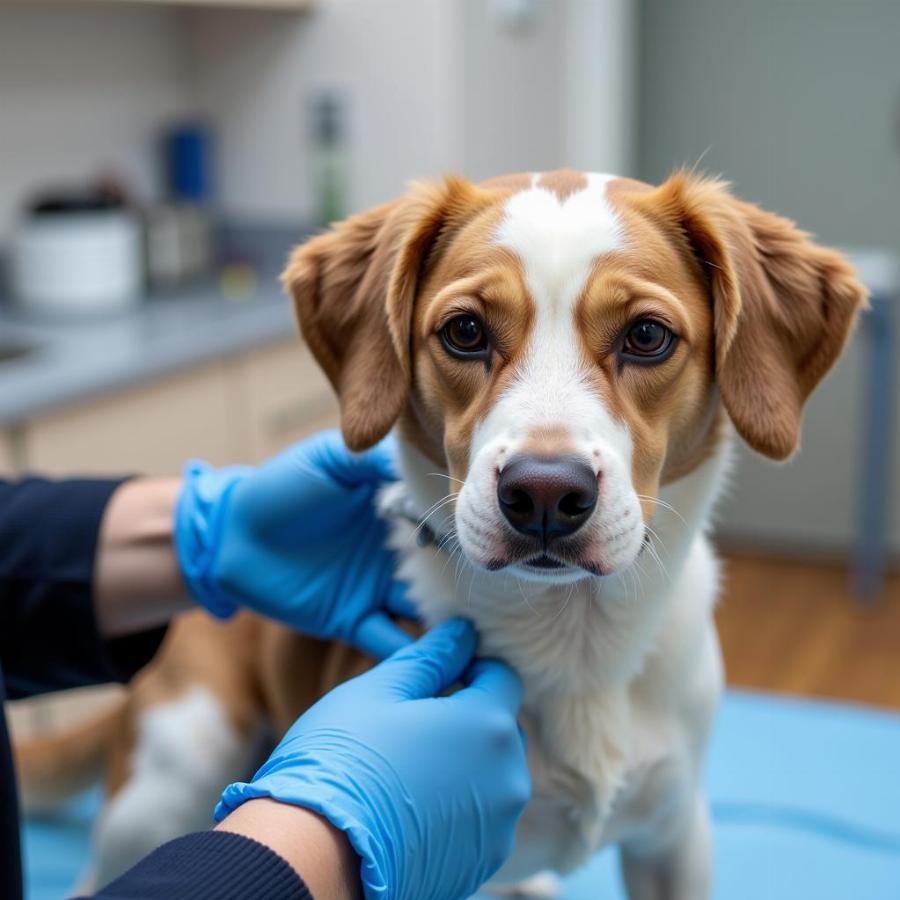Neutering is a common procedure for male dogs that involves the surgical removal of the testicles. This effectively prevents reproduction and can also have behavioral benefits. However, it often leads to questions about a neutered dog’s physiology, one of the most common being, “Can neutered dogs ejaculate?”. The answer is a bit nuanced and requires a deeper understanding of what happens during ejaculation and how neutering affects a dog’s reproductive system.
Understanding Ejaculation in Dogs
Ejaculation in dogs is a multi-step process that involves several components of their reproductive system. It’s important to differentiate between semen and ejaculate to grasp how neutering plays a role.
- Semen: This is the fluid produced by the prostate gland and contains sperm cells manufactured in the testicles.
- Ejaculate: This is the fluid expelled from the penis during sexual activity. It’s made up of three fractions:
- The pre-prostatic fraction, a clear fluid that cleanses the urethra.
- The prostatic fraction, containing the majority of the semen.
- The post-prostatic fraction, a clear fluid that flushes out any remaining sperm.
Neutering and Its Effects on Ejaculation
When a dog is neutered, the testicles are removed, eliminating the primary source of sperm cell production. Therefore, a neutered dog’s ejaculate will not contain sperm. However, the prostate gland remains intact and can still produce fluid.
This means that neutered dogs can technically still ejaculate, but the volume and composition of the fluid will be different. The ejaculate will be significantly smaller in volume and primarily consist of the pre-prostatic and post-prostatic fractions, lacking the milky appearance associated with the sperm-containing prostatic fraction.
Addressing Common Concerns and Misconceptions
It’s not uncommon for pet owners to observe a milky fluid being expressed from their neutered dog’s penis, leading them to believe the neutering procedure was unsuccessful. However, as explained, this fluid is likely just the prostatic fluid and does not contain sperm.
If you have any concerns about your dog’s neutering or notice any unusual discharge, it’s always best to consult with your veterinarian. They can perform tests to confirm the absence of sperm and rule out any potential medical conditions.
 Veterinary Check-up
Veterinary Check-up
Living with a Neutered Dog
Neutering offers numerous benefits for both dogs and their owners. It significantly reduces or eliminates unwanted behaviors associated with testosterone, such as roaming, aggression, and marking territory. Additionally, it eliminates the risk of testicular cancer and reduces the risk of prostate problems.
While neutering does alter a dog’s ability to reproduce and ejaculate normally, it doesn’t diminish their capacity for affection, playfulness, or companionship.
Expert Insight from Dr. Emily Parker, DVM: “Neutering is a safe and effective procedure that can greatly improve the quality of life for both dogs and their owners. While it’s understandable to have questions about the changes it brings, it’s essential to rely on accurate information from reliable sources like your veterinarian.”
Conclusion
While the topic of neutered dogs and ejaculation can be confusing, understanding the basic anatomy and the procedure’s effects can help clear up any misconceptions. While neutered dogs can still technically ejaculate, their fluid will not contain sperm, making them infertile. If you have any concerns or questions, always reach out to your veterinarian for clarification and guidance.
Frequently Asked Questions
- Can a neutered dog still get an erection? Yes, neutered dogs can still get erections. Erections are a physiological response to stimulation and are not solely dependent on the presence of testicles.
- Is it normal for my neutered dog to hump objects? Humping behavior can persist in some neutered dogs, even though it’s often associated with sexual motivation. It can also be a sign of excitement, playfulness, or even anxiety.
- My neutered dog seems to be in pain when he urinates. Should I be worried? Painful urination can be a sign of a urinary tract infection or other health issues. It’s crucial to consult with your veterinarian immediately if you notice this.
Looking for More Information?
For more articles on dog health, behavior, and care, visit our blog at Beaut Dogs.
Beaut Dogs is your one-stop resource for all things dog-related. We provide reliable information, expert advice, and a passionate community of dog lovers. When you need support, reach out to us at [email protected] to get detailed and accurate answers from Beaut Dogs.